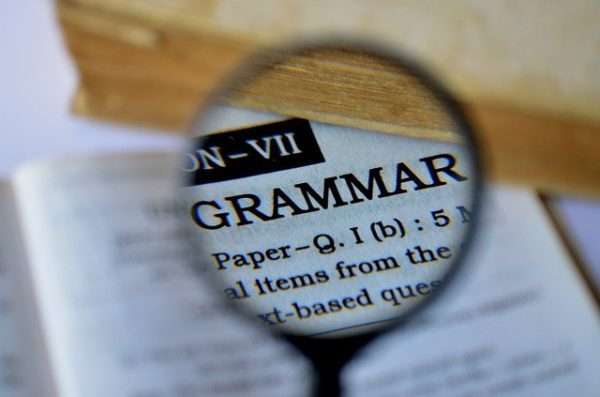Complete Overview of French Grammar
Learning about French grammar can be very intimidating. It’s very different from English. But, if you break French grammar down it its components, it’s actually easy to learn. And once you mastered all of these, with a handful of good vocabulary, you can be completely fluent in French. Master French grammar, and use these rules to guide your French knowledge effortlessly.
The following grammatical components are summaries of how they contribute to French grammar overall. We take a deeper look into their construction, conjugation, and cases in separate posts on this blog. Feel free to check those out for an even better understanding of French grammar.
The Grammar of French Verbs
This is arguably the most important part of French grammar. Every single sentence in French needs to have a verb. Verbs are the words that show the action. Without verbs, you could only talk French in sentence fragments. So make sure you master French verbs, their cases, and their conjugations thoroughly.
French verbs have tenses to show the time the action takes place. The three most major tenses are present, past, and future. Additionally, there are other cases and tenses in French verb grammar that specify the nuances of the French language.
When you put a French verb into a sentence you always need to conjugate it. That’s a clear and constant FRench grammar rule. But, how you conjugate it depends in the verb, the pronoun, and the tense. There are countless variations of this in French.
Read through this ultimate French verb guide to master all of the verb tenses, conjugations, and exceptions. There’s also a list of extremely useful verb vocabulary to get you started.

The Grammar Behind French Nouns
Nouns are the most basic part of French grammar. They’re a person, place, thing, or idea. You’ll encounter nouns in almost every French sentence. That’s why it’s important to master this part of French grammar first. In fact, French actually holds nouns as the most important part of a sentence. While the verb gives the sentence its meaning, French uses nominalization to express emphasis.
French nouns have two genders: masculine and feminine. The gender (and number) of the nouns influence the conjugation of the articles, pronouns, and adjectives around them. There’s no rule that tells you with 100% certainty if a noun is feminine or masculine. But, if you don’t want to memorize all of the French nouns with their genders, use these easy steps to guess the gender with 80% accuracy.
- A noun is feminine if it ends in “-e” or “-ion.”
- The exceptions to this are the endings “-age,” “-ège,” or “-isme.”
- Nearly every other noun ending is masculine.
But, there’s much more to this part of French grammar. Learn more about French nouns to have a solid base for the language.
French Articles in Grammar
As mentioned before, articles are influenced by the gender and number of the noun they represent. But what is an article? Well, it’s not part of a newspaper. In English, there are only three articles: “the”, “a”, and “an”. You put these in front of nouns to show how definite it is. In French, there are a lot more French articles.
French Definite Articles
You use definite articles if the noun is something specific. The English equivalent is “the”. There are 4 different definite articles in French, depending on the gender and number of the noun:
|
Singular
|
Plural |
|
|
Masculine |
le / l’
|
les
|
|
Feminine |
la / l’
|
les |
You use “l'” if the noun starts with a vowel or a mute h.
Examples:
- le cheval – the horse
- l’eau – the water
- la femme – the woman
- les yeux – the eyes
French Indefinite Articles
If you’re not sure about the specific noun, you use indefinite articles in front of it. In English, these would be “a” or “an”. In French, there are only two indefinite articles, and they’re both singular: “un” and “une”. “Un” is for masculine nouns, and “une” is for feminine.
Examples:
- un vélo – a bike
- une voiture – a car
Because the French articles change according to gender, they’re a reliable signal. If you’re not sure what the gender of the noun is, just look at the article in front of it. Learn more about French articles to make sure you never mix them up when you speak French.

French Pronouns
When you’re talking to someone, you probably don’t want to call them by their name in every single sentence. That would sound highly unnatural. Instead, you use pronouns. These are the words that replace a noun in a sentence. In English, these are words like “i”, “you”, “he”, “they”, “her”, “us”. These can vary based on who the speaker is, who they’re talking about, and how formal they want the conversation to be.
There are 15 different kinds of pronouns in the French language. Luckily, a few of them have the same form, so you won’t have to memorize hundreds of different French pronouns.
Subject Pronouns
These pronouns replace the subject noun of the sentence. Knowing French subject pronouns is crucial to everyday speech, and learning French verb conjugation.
- Je – I
- Tu – you (singular informal)
- Il, Elle – he, she
- Nous – we
- Vous – you (plural) or you (singular formal)
- Ils, Elles – them
Direct Object Pronouns
Object pronouns refer to the recipient of the action in the sentence. Direct object pronouns represent the things or persons affected directly by the verb’s action. They replace the object as a noun in the sentence.
- Il la voit. – He sees her.
- Tu m’aimes. – You love me.
Indirect object pronouns
There’s a slight difference between these object pronouns. While they both replace the object, their focus is on a different one. Indirect object pronouns replace people who are indirectly affected by the action.
- Tu m’as donné un chien. – You gave me a dog.
Learn more about French pronouns, and make your French grammar studies even easier.
French Adjectives
Adjectives describe a noun. If you want to tell your love about the beauty of their smile is, or you want to describe the color of your car, you need adjectives for that. As mentioned before, adjectives need to be conjugated to fit the gender and number of the noun they represent.
You add the following letters at the end of the French adjective, depending on the noun:
|
Masculine |
Feminine |
|
|
Singular |
– |
-e |
|
Plural |
-s
|
-es |
Example:
- L’homme intelligent. – The smart man.
- La femme intelligente. – The smart woman.
- L’hommes intelligents. – The smart men.
- La femmes intelligentes. – The smart women.
There are a lot of irregular French adjectives, and even more exceptions to keep in mind. It’s best to brush up on you grammar knowledge with a handy guide to French adjectives.
Possessive Adjectives
If you want to say that something’s yours, you need to use possessive adjectives.
|
Singular Masculin Noun
|
Singular Feminin Noun
|
Plural (Masculin and Feminin)
|
English
|
|
mon
|
ma (mon)
|
mes
|
my
|
|
ton
|
ta (ton)
|
tes
|
your
|
|
son
|
sa (son)
|
ses
|
his
her its one’s |
|
notre
|
notre
|
nos
|
our
|
|
votre
|
votre
|
vos
|
your
|
|
leur
|
leur
|
leurs
|
their
|
Creating Grammatical Sentence Structures
When it comes to French fluency, you need to know how to create sentences. You need all of the components mentioned before for that. Luckily, French and English sentence structures are very similar. They both use SVO (subject-object-verb) structures. So, it’ll be a lot easier to start creating grammatically correct French sentences.
- I eat apples. Je mange des pommes.
“Je” (I) is the subject, “mange” (eat) is the verb, and “des pommes” (apples) is the object. You can see the similarities between the two languages in sentence structure.
If you want to ask a question in France, you can do that in two ways. One is to put a question word at the front of the sentence. Common question words in French are:
- How Comment
What Que / Qu’est-ce que que
What kind Quel genre
When Quand
Where Où
Who Qui
Why Pourquoi
Or, you can also change the word order of the pronoun and the verb, and connect them with a hyphen:
- Can you help us? Pouvez-vous nous aider?
Of course, creating French sentences has a lot of grammatical rules. Learn more about French sentence structures so you can start creating French sentences easily.
French Conjunction
If you want to write complex sentences in French, you need to use conjunctions. These are the connector words that link two equal or unequal parts of the sentence together. There are two main kinds of conjunctions in French: coordinating and subordinating.
Coordinating Conjunctions:
Connect two equal sentences with coordinating conjunctions. These are some of the most common ones in French grammar:
|
French conjunctions
|
English translation
|
|---|---|
|
et
|
and
|
|
parce que
|
because
|
|
puis
|
then
|
|
ou
|
or
|
|
mais
|
but
|
Subordinating Conjunctions:
If the two sentences aren’t equal, you need subordinating conjunction to connect them. Whether you want to signal cause or dependence, these are the most common subordinating conjunctions in French grammar:
|
French conjunctions
|
English translation
|
|---|---|
|
si
|
if
|
|
quand
|
when
|
|
comme
|
since
|
|
que
|
that
|
French Grammatical Cases
Grammatical case, or simply case for short, defines how a word functions in a phrase or sentence. English has three cases:
- Nominative (Subjective)
- Accusative (Objective)
- Genitive (Possessive)
The nominative case is the sentence’s (or phrase’s) subject —these are the nouns that are doing the action of a verb. The accusative case covers all direct objects—these are nouns that are directly receiving the action of a verb. The genitive case shows possession, whether a noun or prounoun.
Let’s look at a quick example in English to illustrate these concepts:
- Do you see him? No, I see his car.
In this sentence, “you” is in the nominative case, because “you” indicates the one doing the action – seeing. The word “him” is in the accusative case, because “him” is receiving the action of the verb—it is “him” that is being seen. In the second part of the example above, “his” is in the genitive case. The word “his” shows that “he” owns something—the car.
This last point serves as a segue into the concept of declension. As noted above, the word “his” is the genitive case of “he”. When a word is modified as it moves from one grammatical case into another case and this change is referred to as declension.
Inflection in English is very weak, and is largely limited to possessive pronouns.
| He | him | his |
|---|---|---|
| She | her | her (no change) |
| They | them | their |
Case defines how a word functions in a phrase or sentence. Inflection is the modification of a word to suit a different case.
Fortunately, French follows the same grammatical cases as English, so you won’t have to memorize structures and cases that you haven’t had any previous exposure to. This is one reason that French is an ideal language for native English speakers to learn.
How to Learn French Grammar
The best way to master all the rules of grammar is to let yourself understand it first. Take your time going through the rules and exceptions. But, never cram. Grammar is quite dry and forcing yourself to learn it will be an excruciating experience. Instead, try these methods to learn French grammar easily:
- Buy a French grammar book: You can buy a grammar book or a French textbook to learn the fundamentals of French grammar. But, don’t let a book slow you down.
- See French grammar in context: Listening and reading French enhanced your grammar skills too. You’ll see how these French grammar rules behave in real life, and you can use that knowledge for your French conversation.
- Write in French: If you learn how to write in French early on, you can learn French grammar as you progress towards French fluency. Write French sentences as you keep these grammar rules in mind.
- Don’t worry about it: When it comes to fluency, grammar doesn’t actually matter. That’s right. If you want to be fluent, you can just start talking. There’s no point having language learning anxiety over grammar. While you should have a basic grasp on French grammar, don’t worry about as you speak. Just focus on communicating your ideas well.
Learn French Grammar Naturally
Learning French grammar isn’t an impossible task. It’s actually pretty straightforward, you just have to be careful with the exceptions. If you want to learn grammar naturally while enhancing your vocabulary at the same time, just look at the most common French phrases. They already have all the grammar you need. And, you can find them all in OptiLingo.
OptiLingo is an app with a collection of the most useful high-frequency French words and phrases. These common expressions are used by French locals every day. If you want to speak like them, you need this vocabulary list. Don’t worry about grammar, it will naturally come to you if you use OptiLingo!










